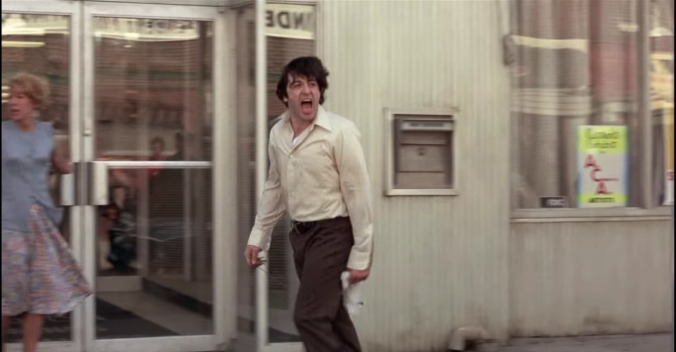As an actor, Al Pacino is untouchable. He can make all the Jack And Jills, S1m0nes, and 88 Minutes he wants; none of them can erase his powerhouse early work and the smattering of inspired latter-day work that’s come to define his insane career. To pick a favorite Pacino performance is an exercise in futility, but many who’ve tackled the task find themselves sidestepping The Godfather in favor of his turn in Sidney Lumet’s 1975 crime drama Dog Day Afternoon. As Sonny Wortzik, Pacino is all crackling sparks and exposed nerves, unhinged and empathetic at the same time. It’s not that huge of a surprise, then, that one of the film’s most iconic moments came out of a moment of improvisation.
In a new, wide-ranging interview with Vulture’s David Edelstein in support of Pacino’s Way, an upcoming retrospective, Pacino reveals that it was the whisper of a single word that sent him careening down an unscripted path that’s still referenced, parodied, and fawned over in film circles around the globe. For fans of the film, it’s not too hard to figure out what that one word was, as it became synonymous with police brutality.
It was an assistant director who whispered the magic word to Pacino in the now-famous scene in which he rallies the crowd outside the bank. “He says, ‘Say “Attica.” ’ I said, ‘What?’ He said, ‘Go ahead. Say it to the crowd out there. “Attica.” Go ahead.’ So I sort of half got it, so when I got out there, I looked around. This is on-camera now. Cameras are rolling, and I looked around, and I just said, ‘Hey, you know, Attica, right?’ … And we start improvising, and you get that whole Attica scene, because an AD whispered in my ear as I’m going out a door. I mean, that is what movies are.”
Pacino also opens up about his working relationship with Dog Day co-star John Cazale, who died in 1978. As tends to happen whenever you watch a Cazale performance, Pacino’s recollection of his friend is enough to make you grieve his premature passing that much more.
“We wanted to work with each other so much they had to separate us,” he says, “like when you’re in school and you have a couple of clowns.” With Cazale, he learned to live inside improvisations: “I would come in to do a scene, and he would sit there and look at me as I started talking. He’d say, ‘What are you talking about? What are we doing here?’ It wasn’t pretentious. He was serious. ‘What the fuck are you saying to me?’ I’d say, ‘Well, I don’t know.’ ‘Are you just saying the words of the play? I don’t want to hear that.’ ‘Oh, then fuck you, do whatever you want to … ’ And we’d get into this series of improvs, and guess what he would do? He would circle it, circle it, circle it, until we came right to the scene. I mean, amazing stuff. Amazing stuff. That spirit was in the earlier films I did.”
The piece is packed with revelations, whether it be regarding his efforts to impress producers on the set of The Godfather to the love he still harbors for his two biggest failures: 1977's Bobby Deerfield and 1985's Revolution. No word of his Jack and Jill rap, unfortunately, but perhaps the video speaks for itself there.
